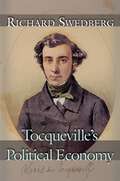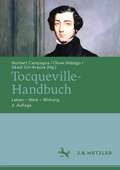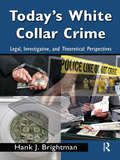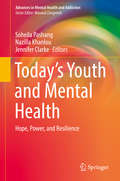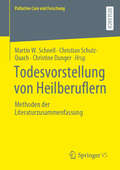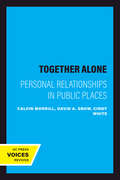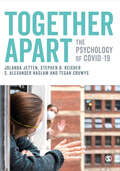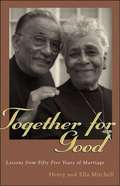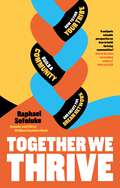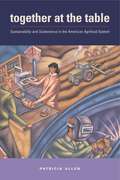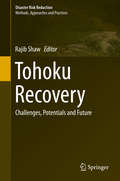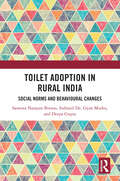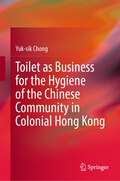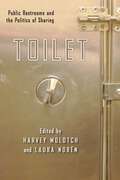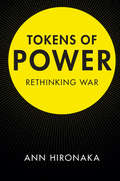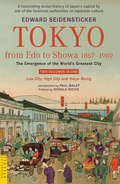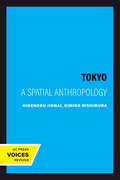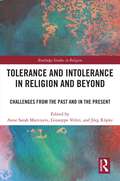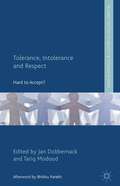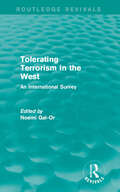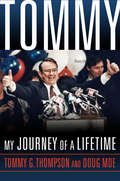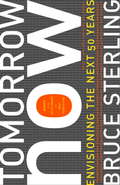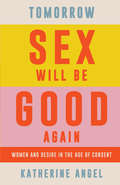- Table View
- List View
Tocqueville's Political Economy
by Richard SwedbergAlexis de Tocqueville (1805-59) has long been recognized as a major political and social thinker as well as historian, but his writings also contain a wealth of little-known insights into economic life and its connection to the rest of society. In Tocqueville's Political Economy, Richard Swedberg shows that Tocqueville had a highly original and suggestive approach to economics--one that still has much to teach us today. Through careful readings of Tocqueville's two major books and many of his other writings, Swedberg lays bare Tocqueville's ingenious way of thinking about major economic phenomena. At the center of Democracy in America, Tocqueville produced a magnificent analysis of the emerging entrepreneurial economy that he found during his 1831-32 visit to the United States. More than two decades later, in The Old Regime and the Revolution, Tocqueville made the complementary argument that it was France's blocked economy and society that led to the Revolution of 1789. In between the publication of these great works, Tocqueville also produced many lesser-known writings on such topics as property, consumption, and moral factors in economic life. When examined together, Swedberg argues, these books and other writings constitute an interesting alternative model of economic thinking, as well as a major contribution to political economy that deserves a place in contemporary discussions about the social effects of economics.
Tocqueville-Handbuch: Leben – Werk – Wirkung
by Oliver Hidalgo Norbert Campagna Skadi Siiri KrauseDas Handbuch gewährt einen umfassenden Überblick über Tocquevilles Leben, Werk und Wirkung auf dem aktuellen Stand der historischen, philosophischen und sozialwissenschaftlichen Forschung. Dem äußerst facettenreichen, in Deutschland aber nach wie vor unterschätzten Autor widmet dieser Band eine ebenso kompakte wie systematische Darstellung, die auf der Basis eines strukturierten Zugriffs und unter Berücksichtigung aller seiner Schriften verschiedene Aspekte seines Denkens erfasst. Deutschsprachige Leserinnen und Leser können sich schnell und zielführend fundierte Informationen über Tocquevilles Theorien, seine zentralen Begriffe sowie die wichtigsten Einflüsse verschaffen. Zugleich dient das Handbuch als Kompass zur Einordnung von Tocquevilles Analysen in gegenwärtige Debatten und Themengebiete und gibt anschlussfähige Hinweise für die Konzeption von Projekten in Forschung und Lehre.
Today's White Collar Crime: Legal, Investigative, and Theoretical Perspectives (Criminology and Justice Studies)
by Hank J. BrightmanWritten as a text for undergraduate courses, this book appeals to instructors interested in teaching the field of white-collar crime, both from a matter-of-fact investigative perspective as well as a decidedly academic endeavor. Accordingly, it goes beyond discussing the basic theories and typologies of commonly-encountered offenses such as fraud, forgery, embezzlement, and currency counterfeiting, to include the legalistic aspects of white-collar crime. It also explores the investigative tools and analytical techniques needed if students wish to pursue careers in this field. Because of the inextricable links between abuse-of-trust crimes such as misuse of government office, nepotism, and bribery and the realm of corporate corruption, these issues are also included. The text also maintains a connection between white-collar crime and acts of international terrorism; as well as the more controversial aspects of possible abuses of power within the public arena posed by the USA Patriot Act of 2001 and the asset forfeiture process. Adapted readings at the end of each chapter provide readable cases of white collar crime in action to illustrate the principles / theories presented. Activities, Exercises, and Photographs are also included in each of the 10 chapters and a Companion Web Site provides additional test items and other instructor support material.
Today’s Youth and Mental Health: Hope, Power, And Resilience (Advances in Mental Health and Addiction)
by Nazilla Khanlou Soheila Pashang Jennifer ClarkeThis book focuses on the social and intersectional determinants of mental health among youth. The innovative and cutting edge text arises out of multidisciplinary fields of academic, researchers, policy makers, practitioners, artists, and youth. Contributions from Canada, Germany, Portugal, South Korea, Burkina Faso, Afghanistan, and Jamaica addresses the complexities and the opportunities for youth across contexts. Each chapter entails an introduction to the topic, literature review and research findings, discussion, and implications in regard to research, policy, and practice. A unique aspect of the book is the inclusion of a critical response to each chapter’s content from diverse stakeholders (such as policy makers, front line workers, practitioners, community activists, artists and youth).The book is a critical and current contribution to exploring youth mental health and, specifically, the ways in which youth learn, live, and resist in a world around them. Topics examined include youth social engagement, civic integration, and political participation at multiple local, regional, and transnational levels.
Todesvorstellung von Heilberuflern: Methoden der Literaturzusammenfassung (Palliative Care und Forschung)
by Martin W. Schnell Christine Dunger Christian Schulz-QuachHeilberufler, d.h. Ärzt*innen, Pflegende und Vertreter anderer Professionen, die in der Versorgung sterbender Menschen und deren Angehöriger tätig sind, haben Vorstellungen vom Tod ausgebildet. Diese leiten die Behandlungsweise von sterbenden Menschen, da sie Antworten auf fundamentale Fragen geben. Was ist der Tod? Wann tritt ein Mensch in seine letzte Lebensphase ein? Todesvorstellungen sind meist Mischkonzepte. Wissenschaft, Berufserfahrung, Mythologie, Religion, allgemeine Werte gehen in sie ein. Die vorliegende Publikation erforscht die Todesvorstellungen von Heilberuflern und stellt sie in ihrer Diversität dar. Der Band führt dabei Methoden der Literaturzusammenfassung vor, die von fortgeschrittenen Studierenden, Doktoranden und jungen Forscher*innen verwendet werden können, um einen relevanten Forschungsstand zu dokumentieren. Eine wissenschaftshistorische und methodische Reflexion fundiert diese Vorstellung.
Together Alone: Personal Relationships in Public Places
by David A. Snow Calvin Morrill Cindy H. WhiteExploring locales such as city streets, bus stops, parking lots, bars, retail establishments, and discussion groups, Together Alone ventures into what is often thought of as the realm of passing strangers to examine the nature of personal relationships conducted in public spaces. While most studies of social interaction have gone behind closed doors to focus on relationships in the family, school, and workplace, this innovative collection pushes the boundaries of the field by analyzing both fleeting and anchored relationships in the seldom-studied communal areas where much of contemporary life takes place. The contributors shed light on the diversity and character of day-to-day negotiations in public spaces and at the same time illuminate how these social ties paradoxically blend aspects of durability and brevity, of emotional closeness and distance, of being together and alone.
Together Apart: The Psychology of COVID-19
by Jolanda Jetten S. Alexander Haslam Stephen D. Reicher Tegan CruwysWritten by leading social psychologists with expertise in leadership, health and emergency behaviour – who have also played an important role in advising governments on COVID-19 – this book provides a broad but integrated analysis of the psychology of COVID-19It explores the response to COVID-19 through the lens of social identity theory, drawing from insights provided by four decades of research. Starting from the premise that an effective response to the pandemic depends upon people coming together and supporting each other as members of a common community, the book helps us to understand emerging processes related to social (dis)connectedness, collective behaviour and the societal effects of COVID-19. In this it shows how psychological theory can help us better understand, and respond to, the events shaping the world in 2020. Considering key topics such as:LeadershipCommunicationRisk perceptionSocial isolationMental healthInequalityMisinformationPrejudice and racismBehaviour changeSocial DisorderThis book offers the foundation on which future analysis, intervention and policy can be built.We are proud to support the research into Covid-19 and are delighted to offer the finalised eBook for free.All Royalties from this book will be donated to charity.
Together Apart: The Psychology of COVID-19
by Jolanda Jetten S. Alexander Haslam Stephen D. Reicher Tegan CruwysWritten by leading social psychologists with expertise in leadership, health and emergency behaviour – who have also played an important role in advising governments on COVID-19 – this book provides a broad but integrated analysis of the psychology of COVID-19It explores the response to COVID-19 through the lens of social identity theory, drawing from insights provided by four decades of research. Starting from the premise that an effective response to the pandemic depends upon people coming together and supporting each other as members of a common community, the book helps us to understand emerging processes related to social (dis)connectedness, collective behaviour and the societal effects of COVID-19. In this it shows how psychological theory can help us better understand, and respond to, the events shaping the world in 2020. Considering key topics such as:LeadershipCommunicationRisk perceptionSocial isolationMental healthInequalityMisinformationPrejudice and racismBehaviour changeSocial DisorderThis book offers the foundation on which future analysis, intervention and policy can be built.We are proud to support the research into Covid-19 and are delighted to offer the finalised eBook for free.All Royalties from this book will be donated to charity.
Together For Good: Lessons from Fifty Five Years of Marriage
by Henry H. Mitchell Ella P. MitchellThe book tells how the Mitchells coped with the first year of marriage, financial problems, the birth and adoption of their children, switching jobs, and moving.
Together We Thrive: How to find your tribe, build a community and create the dream network
by Raphael Sofoluke‘Raphael has an experience few can equal. His book offers a uniquely valuable perspective on how to build thriving communities!’ Steven Bartlett, bestselling author of Diary of a CEOWe live in a world of individualism, where people act in their own interests, striving for their own success. Our focus on self-development means we’ve overlooked a vital and transformative power.In Together We Thrive, Raphael Sofoluke, Founder and CEO behind UK Black Business Show and UK Black Business Week, reveals the immense potential of harnessing a community.You’ll learn how to nurture the connections that will become your currency and build relationships that will fuel your success. Your network speaks louder than you can, amplifies your story, mission and values, and is more resilient than you could ever be on your own. Packed with insights and inspiration from Sofoluke and his own community of highly successful people, Together We Thrive will help you find a tribe of invaluable supporters who will hold you to account and make sure that you reach your full potential.If you want to go far, you have to go together.
Together at the Table: Sustainability and Sustenance in the American Agrifood System (Rural Studies)
by Patricia AllenEverywhere you look people are more aware of what they eat and where their food comes from. In a cafeteria in Los Angeles, children make their lunchtime food choices at fresh-fruit and salad bars stocked with local foods. In a community garden in New York, low-income residents are producing organically grown fruits and vegetables for their own use and to sell at market. In Madison, Wisconsin, shoppers select their food from a bounty of choices at a vibrant farmers’ market. Together at the Table is about people throughout the United States who are building successful alternatives to the contemporary agrifood system and their prospects for the future. At the heart of these efforts are the movements for sustainable agriculture and community food security. Both movements seek to reconstruct the agrifood system—the food production chain, from the growing of crops to food production and distribution—to become more ecologically sound, economically viable, and socially just. Allen describes the ways in which people working in these movements view the world and how they see their place in challenging and reshaping the agrifood system. She also shows how ideas and practices of sustainable agriculture and community food security have already woven their way into the dominant agrifood institutions. Allen explores the possibilities this process may hold for improving social and environmental justice in the American agrifood system.Together at the Table is an important reminder that much work still remains to be done. Now that the ideas and priorities of alternative food movements have taken hold, it is time for the next—even more challenging—step. Alternative agrifood movements must acknowledge and address the deeper structural and cultural patterns that constrain the long-term resolution of social and environmental problems in the agrifood system.
Together, Alone
by Susan Wittig AlbertWhat does it mean to belong to a place, to be truly rooted and grounded in the place you call home? How do you commit to a marriage, to a full partnership with another person, and still maintain your own separate identity? These questions have been central to Susan Wittig Albert's life, and in this beautifully written memoir, she movingly describes how she has experienced place, marriage, and aloneness while creating a home in the Texas Hill Country with her husband and writing partner, Bill Albert. Together, Alone opens in 1985, as Albert leaves a successful, if rootless, career as a university administrator and begins a new life as a freelance writer, wife, and homesteader on a patch of rural land northwest of Austin. She vividly describes the work of creating a home at Meadow Knoll, a place in which she and Bill raised their own food and animals, while working together and separately on writing projects. Once her sense of home and partnership was firmly established, Albert recalls how she had to find its counterbalance--a place where she could be alone and explore those parts of the self that only emerge in solitude. For her, this place was Lebh Shomea, a silent monastic retreat. In writing about her time at Lebh Shomea, Albert reveals the deep satisfaction she finds in belonging to a community of people who have chosen to be apart and experience silence and solitude.
Tohoku Recovery
by Rajib ShawThe March 11 disaster in 2011, known as the Great East Japan Earthquake and Tsunami, caused extensive damage in various sectors. Through the recovery process, special lessons are being learned and applied in the affected region. This book attempts to draw lessons from different issues and sectors such as policy perspectives (both national and local), the role of international NGOs, fishing industries and other livelihoods, temporary housing, health, heritage, and lesson sharing. The book outlines the need and approach for sharing the lessons with wider communities in developing those lessons. Based on intensive field research, the book also provides some key lessons from community-based recovery in the affected regions of Iwate, Miyagi, and Fukushima prefectures. This book has 13 chapters in two parts. The first part of the book, with seven chapters, provides a set of lessons from diverse sectors. The second part, with six chapters, provides case studies from different areas of Tohoku. Six specific issues are addressed in part 1: the role of international agencies, livelihood (namely, fisheries) recovery, temporary housing, health, heritage, and lesson sharing. Part 2 has six case studies from different areas of the Tohoku region, including Fukushima. The primary target groups for this book are students and researchers in the fields of environment, disaster risk reduction, and recovery studies. The book provides them with a good idea of the current research trends in the field and furnishes basic knowledge about these vital topics. Another target group comprises practitioners and policy makers, who will be able to apply the knowledge collected here to policy and decision-making.
Toilet Adoption in Rural India: Social Norms and Behavioural Changes
by Indranil De Saswata Biswas Gyan Mudra Deepa GuptaThis book examines sanitation and toilet access across rural India, focusing on psychological, socio-cultural, infrastructural, and normative barriers to the initiative of Swachh Bharat Mission (SBM). While sketching the evolution of sanitation policies in India, it assesses their impact on sanitation behaviour. It also studies the implications of variations in caste, religion, and geography on toilet usage across Indian states.By analysing data from various states and intensive micro-level studies of three states, i.e., rural Bihar, Gujarat, and Telangana, this volume: Suggests that socio-cultural factors are as significant as economic factors in shaping sanitation behaviour; Argues that the concepts of cleanliness and pollution are often determined by the social-cultural context, rooted in historical events that have shaped traditional beliefs and ideas about space; Explores gendered perspectives on the usage of and access to toilets; Highlights the limited effectiveness of Information, Education, and Communication (IEC) programs in encouraging toilet adoption and emphasizes the need for information dissemination at the ground level; Gives recommendations for enhancing the adoption of toilets in rural India, including provision for more than one toilet per household, uninterrupted access to water, and behavioural change to combat open defecation. This book will be useful to students studying sociology, psychology, social work, and development studies. It will also be an invaluable companion to NGOs, social workers and activists actively involved in water, sanitation, and hygiene. Moreover, this book holds immense value as a pivotal resource and point of reference for policymakers engaged in rural development with a specific focus on Sustainable Development Goals.
Toilet as Business for the Hygiene of the Chinese Community in Colonial Hong Kong
by Yuk-sik ChongThis book analyses how public toilets were provided by the government and local business in Hong Kong between the 1860s and 1930s through a process that was embedded in class and racial politics. Addressing public toilet provision from a political economy perspective, it focuses on the interplay of the cross-border night soil business between Hong Kong and China’s silk producing area; the silk market between China and Colonial powers; the Hong Kong land market between the colonial government and Chinese business; and how these factors jointly produced a network of toilets in the colony. As the book shows, the commercial viability of toilets created multiple logics and a new moral geography; further, exploring the topic can help us gain a better understanding of how urban governance functioned in colonies and how it intertwined with economic contingencies within a global economic system. The intended readership includes academics and members of the general public with an interest in colonialism, public infrastructures, public health, government–business relations, and urban governance.
Toilet: Public Restrooms and the Politics of Sharing (NYU Series in Social and Cultural Analysis #1)
by Harvey Molotch Laura NorénA sociological study of public restroomsSo much happens in the public toilet that we never talk about. Finding the right door, waiting in line, and using the facilities are often undertaken with trepidation. Don’t touch anything. Try not to smell. Avoid eye contact. And for men, don’t look down or let your eyes stray. Even washing one’s hands are tied to anxieties of disgust and humiliation. And yet other things also happen in these spaces: babies are changed, conversations are had, make-up is applied, and notes are scrawled for posterity.Beyond these private issues, there are also real public concerns: problems of public access, ecological waste, and—in many parts of the world—sanitation crises. At public events, why are women constantly waiting in long lines but not men? Where do the homeless go when cities decide to close public sites? Should bathrooms become standardized to accommodate the disabled? Is it possible to create a unisex bathroom for transgendered people?In Toilet, noted sociologist Harvey Molotch and Laura Norén bring together twelve essays by urbanists, historians and cultural analysts (among others) to shed light on the public restroom. These noted scholars offer an assessment of our historical and contemporary practices, showing us the intricate mechanisms through which even the physical design of restrooms—the configurations of stalls, the number of urinals, the placement of sinks, and the continuing segregation of women’s and men’s bathrooms—reflect and sustain our cultural attitudes towards gender, class, and disability. Based on a broad range of conceptual, political, and down-to-earth viewpoints, the original essays in this volume show how the bathroom—as a practical matter—reveals competing visions of pollution, danger and distinction.Although what happens in the toilet usually stays in the toilet, this brilliant, revelatory, and often funny book aims to bring it all out into the open, proving that profound and meaningful history can be made even in the can.Contributors: Ruth Barcan, Irus Braverman, Mary Ann Case, Olga Gershenson, Clara Greed, Zena Kamash,Terry Kogan, Harvey Molotch, Laura Norén, Barbara Penner, Brian Reynolds, and David Serlin.
Tokens of Power
by Ann HironakaWar presents a curious paradox. Interstate war is arguably the most carefully planned endeavor by states, yet military history is filled with disasters and blunders of monumental proportions. These anomalies happen because most military history presumes that states are pursuing optimal strategies in a competitive environment. This book offers an alternative narrative in which the pillars of military planning - evaluations of power, strategy, and interests - are theorized as social constructions rather than simple material realities. States may be fighting wars primarily to gain or maintain power, yet in any given historical era such pursuits serve only to propel competition; they do not ensure military success in subsequent generations. Allowing states to embark on hapless military ventures is fraught with risks, while the rewards are few.
Tokyo from Edo to Showa 1867-1989: The Emergence of the World's Greatest City
by Donald Richie Edward Seidensticker Paul WaleyThere can be few cities in the world that live, pulsate, and breathe through their geography as Tokyo does, few cities with a history that shifts through the creases of space as does that of Tokyo. This is particularly ironic in a city whose neighborhoods today hold few distinctive features and whose gentle topography has been all but obscured by batteries of building. <P><P> But it was not always so, and what better way is there of writing Tokyo's history than by reflecting this shifting geography as neighborhoods prospered and declined while others, more aspirational, climbed up the socio-spacial ladder? This is precisely what Edward Seidensticker does in the pages of these books, brought together here together for the first time under one cover with numerous illustrations and an insert of beautifully colored Japanese woodblock prints of Tokyo from the era.Tokyo: From Edo to Showa tells the story and history of Tokyo's transformation from the Shogun's capital in an isolated Japan to one of the most renowned modern cities in the world.
Tokyo: A Spatial Anthropology
by Hidenobu JinnaiTokyo: destroyed by the earthquake of 1923 and again by the firebombing of World War II. Does anything remain of the old city?The internationally known Japanese architectural historian Jinnai Hidenobu set out on foot to rediscover the city of Tokyo. Armed with old maps, he wandered through back alleys and lanes, trying to experience the city's space as it had been lived by earlier residents. He found that, despite an almost completely new cityscape, present-day inhabitants divide Tokyo's space in much the same way that their ancestors did two hundred years before.Jinnai's holistic perspective is enhanced by his detailing of how natural, topographical features were incorporated into the layout of the city. A variety of visual documents (maps from the Tokugawa and Meiji periods, building floorplans, woodblock prints, photographs) supplement his observations. While an important work for architects and historians, this unusual book will also attract armchair travelers and anyone interested in the symbolic uses of space.(A translation of Tokyo no kûkan jinruigaku.)
Tolerance and Intolerance in Religion and Beyond: Challenges from the Past and in the Present (Routledge Studies in Religion)
by Jörg Rüpke Giuseppe Veltri Anne Sarah MatviyetsThis book focuses on religious tolerance and intolerance in terms of practices, institutions, and intellectual habits. It brings together an array of historical and anthropological studies and philosophical, cognitive, and psychological explorations by established scholars from a range of disciplines. The contributions feature modern and historic instances of tolerance and intolerance across a variety of geographies, societies, and religious traditions. They help readers to gain an understanding of the notion of tolerance and the historical consequences of intolerance from the perspective of different cultures, religions, and philosophies. The volume highlights tolerance’s potential to be a means to build bridges and at the same time determine limits. Whilst the challenge of promoting tolerance has mostly been treated as a value or practice of demographic or religious majorities, this book offers a broader take and pays attention to minority perspectives. It is a valuable reference for scholars of religious studies, the sociology of religion, and the history of religion.
Tolerance, Intolerance and Respect
by Tariq Modood Jan DobbernackWith the ethnic, cultural and religious diversity that is a feature of European societies today, pluralism is experienced in new and challenging ways. In many places, an urban cosmopolitan mix sits side by side with group-based expressions of faith and culture. The debate about the types of 'acceptance' that these situations require tend to follow new patterns. Increasing openness and respect for some may rest upon a reinforced intolerance towards others. This complicates and challenges our understanding of what it means for societies to be accepting, tolerant or respectful of cultural diversity in its various forms. This volume seeks to meet this challenge with perspectives that consider new dynamics towards tolerance, intolerance and respect.
Tolerating Terrorism in the West: An International Survey (Routledge Revivals)
by Noemi Gal-OrHas terrorism lost the power to shock and appal? Have liberal democracies learned to tolerate terrorism? Using case studies of governments’ and societies’ responses to terrorism, this book, first published in 1991, shows how attitudes towards terrorism have developed. Five western countries with differing political structures and histories are studied: Belgium, the Federal Republic of Germany, Israel, Italy and Spain. The analysis investigates the roles of social, political, legal, professional and religious institutions and movements in formulating the approved attitude towards terrorism that governs political bodies as well as society at large. This book will be of interest to students of politics and sociology.
Tommy: My Journey of a Lifetime
by Doug Moe Tommy G. ThompsonThe many facets of Tommy G. Thompson—small-town grocer's son, brash campaigner with a common touch, shrewd political strategist, savvy policy wonk, and ebullient promoter of Wisconsin—come across vividly in these pages. Thompson, with journalist Doug Moe, traces his journey from boyhood to politics to the world stage, including his unprecedented four terms as Wisconsin governor, his service as a cabinet secretary under President George W. Bush, and his continuing work in global efforts to fight AIDS, tuberculosis, and malaria. Personal and revealing stories punctuate the biographical details and policy discussions. Here is Tommy as a young man, just happening to be on the National Mall in 1964 when Dr. Martin Luther King told the nation "I have a dream." Here is Tommy as Wisconsin governor, struggling to start a Harley-Davidson motorcycle before leading "a pack of Hell's Republicans" on a ride through the state. Here is Tommy in Washington after the 9/11 attacks, slipping out of a secure bunker (in defiance of orders) to aid the emergency medical response. Thompson speaks candidly of his achievements and regrets, including his involvement with welfare reform, school choice, land conservancy, prisons, the financing of Miller Park, stem cell research, and health insurance.
Tomorrow Now: Envisioning the Next Fifty Years
by Bruce SterlingVisionary author Bruce Sterling views the future like no other writer. In his first nonfiction book since his classic The Hacker Crackdown, Sterling describes the world our children might be living in over the next fifty years and what to expect next in culture, geopolitics, and business. Taking a cue from one of William Shakespeare's greatest soliloquies, Sterling devotes one chapter to each of the seven stages of humanity: birth, school, love, war, politics, business, and old age. As our children progress through Sterling's Shakespearean life cycle, they will encounter new products; new weapons; new crimes; new moral conundrums, such as cloning and genetic alteration; and new political movements, which will augur the way wars of the future will be fought.
Tomorrow Sex Will Be Good Again: Women and Desire in the Age of Consent
by Katherine AngelA provocative, elegantly written analysis of female desire, consent, and sexuality in the age of MeTooWomen are in a bind. In the name of consent and empowerment, they must proclaim their desires clearly and confidently. Yet sex researchers suggest that women&’s desire is often slow to emerge. And men are keen to insist that they know what women—and their bodies—want. Meanwhile, sexual violence abounds. How can women, in this environment, possibly know what they want? And why do we expect them to? In this elegant, searching book—spanning science and popular culture; pornography and literature; debates on Me-Too, consent and feminism—Katherine Angel challenges our assumptions about women&’s desire. Why, she asks, should they be expected to know their desires? And how do we take sexual violence seriously, when not knowing what we want is key to both eroticism and personhood? In today&’s crucial moment of renewed attention to violence and power, Angel urges that we remake our thinking about sex, pleasure, and autonomy without any illusions about perfect self-knowledge. Only then will we fulfil Michel Foucault&’s teasing promise, in 1976, that &“tomorrow sex will be good again.&”
